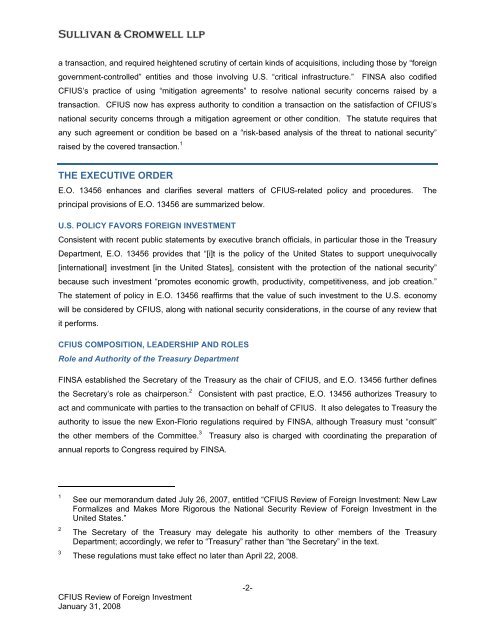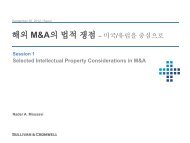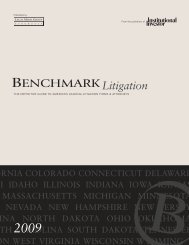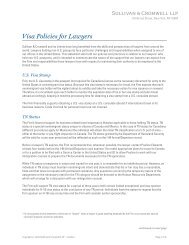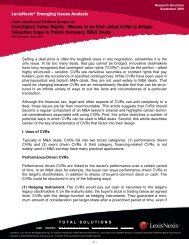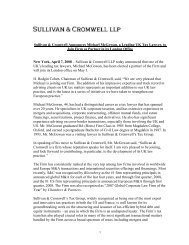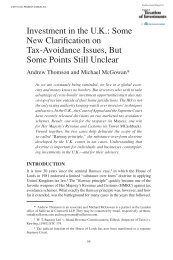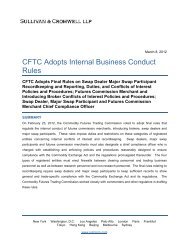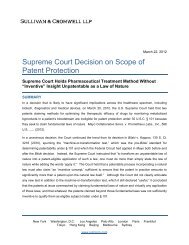Download Full PDF - Sullivan & Cromwell
Download Full PDF - Sullivan & Cromwell
Download Full PDF - Sullivan & Cromwell
Create successful ePaper yourself
Turn your PDF publications into a flip-book with our unique Google optimized e-Paper software.
a transaction, and required heightened scrutiny of certain kinds of acquisitions, including those by “foreign<br />
government-controlled” entities and those involving U.S. “critical infrastructure.” FINSA also codified<br />
CFIUS’s practice of using “mitigation agreements” to resolve national security concerns raised by a<br />
transaction. CFIUS now has express authority to condition a transaction on the satisfaction of CFIUS’s<br />
national security concerns through a mitigation agreement or other condition. The statute requires that<br />
any such agreement or condition be based on a “risk-based analysis of the threat to national security”<br />
raised by the covered transaction. 1<br />
THE EXECUTIVE ORDER<br />
E.O. 13456 enhances and clarifies several matters of CFIUS-related policy and procedures. The<br />
principal provisions of E.O. 13456 are summarized below.<br />
U.S. POLICY FAVORS FOREIGN INVESTMENT<br />
Consistent with recent public statements by executive branch officials, in particular those in the Treasury<br />
Department, E.O. 13456 provides that “[i]t is the policy of the United States to support unequivocally<br />
[international] investment [in the United States], consistent with the protection of the national security”<br />
because such investment “promotes economic growth, productivity, competitiveness, and job creation.”<br />
The statement of policy in E.O. 13456 reaffirms that the value of such investment to the U.S. economy<br />
will be considered by CFIUS, along with national security considerations, in the course of any review that<br />
it performs.<br />
CFIUS COMPOSITION, LEADERSHIP AND ROLES<br />
Role and Authority of the Treasury Department<br />
FINSA established the Secretary of the Treasury as the chair of CFIUS, and E.O. 13456 further defines<br />
the Secretary’s role as chairperson. 2 Consistent with past practice, E.O. 13456 authorizes Treasury to<br />
act and communicate with parties to the transaction on behalf of CFIUS. It also delegates to Treasury the<br />
authority to issue the new Exon-Florio regulations required by FINSA, although Treasury must “consult”<br />
the other members of the Committee. 3 Treasury also is charged with coordinating the preparation of<br />
annual reports to Congress required by FINSA.<br />
1<br />
2<br />
3<br />
See our memorandum dated July 26, 2007, entitled “CFIUS Review of Foreign Investment: New Law<br />
Formalizes and Makes More Rigorous the National Security Review of Foreign Investment in the<br />
United States.”<br />
The Secretary of the Treasury may delegate his authority to other members of the Treasury<br />
Department; accordingly, we refer to “Treasury” rather than “the Secretary” in the text.<br />
These regulations must take effect no later than April 22, 2008.<br />
CFIUS Review of Foreign Investment<br />
January 31, 2008<br />
-2-


